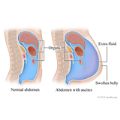Our Health Library information does not replace the advice of a doctor. Please be advised that this information is made available to assist our patients to learn more about their health. Our providers may not see and/or treat all topics found herein.
Paracentesis
Test Overview
Paracentesis is a procedure to take out fluid that has collected in the belly (peritoneal fluid) outside the intestines. This fluid buildup is called ascites. Ascites may be caused by infection, inflammation, an injury, or other conditions, such as cirrhosis or cancer. The fluid is taken out using a thin needle put through the belly. The fluid is sent to a lab and studied to find the cause of the fluid buildup. Paracentesis also may be done to take the fluid out to relieve belly pressure or pain.
Why It Is Done
Paracentesis may be done to:
- Find the cause of fluid buildup in the belly.
- Diagnose an infection in the peritoneal fluid.
- Check for certain types of cancer.
- Remove a large amount of fluid that is causing pain or trouble breathing or that is affecting how the kidneys or the intestines (bowel) are working.
How To Prepare
If you take a medicine that prevents blood clots, your doctor may tell you to stop taking it before your procedure. Or your doctor may tell you to keep taking it. (These medicines include aspirin and other blood thinners.) Make sure that you understand exactly what your doctor wants you to do.
Other blood tests may be done before a paracentesis to make sure that you don't have any bleeding or clotting problems.
How It Is Done
This procedure may be done in your doctor's office, an emergency room, or the X-ray department of a hospital, or at your bedside in the hospital.
You will empty your bladder before the procedure.
If a large amount of fluid is going to be taken out during the procedure, you may lie on your back with your head raised. People who have less fluid taken out may sit up. The site where your doctor will put the needle is cleaned with a special soap and draped with sterile towels.
Your doctor puts a numbing medicine into the skin of your belly. When the area is numb, your doctor will gently and slowly put the paracentesis needle in where the extra fluid is. If your test is done in the X-ray department, an ultrasound may be used to show where the fluid is in your belly.
If fluid is being removed for testing, your doctor will use a syringe to take a sample of fluid.
If there's a large amount of fluid, the paracentesis needle may be hooked by a small tube to a vacuum bottle for the fluid to drain into it. Generally, up to 4 L (1 gal) of fluid is taken out.
If your doctor needs to remove a larger amount of fluid, there is a small chance that your blood pressure could drop to a low level. You may be given fluids through an intravenous line (I.V.) in a vein in your arm. It is important that you lie completely still during the procedure, unless you are asked to change positions to help drain the fluid.
When the fluid has drained, the needle is taken out and a bandage is placed over the site. After the test, your pulse, blood pressure, and temperature are watched for about an hour. You may be weighed and the distance around your belly may be measured before and after the test.
How long the test takes
The procedure may take from a few minutes to 30 minutes or more.
How It Feels
You may feel a brief, sharp sting when the numbing medicine is given. When the paracentesis needle is put into your belly, you may feel a temporary sharp pain or pressure.
You may feel dizzy or lightheaded if a large amount of fluid is taken out. Tell your doctor if you do not feel well during the test.
Risks
There is a very small chance that the paracentesis needle may injure the bladder, bowel, or a blood vessel in the belly.
There is a very small chance of causing an infection in the belly.
If a large amount of fluid is removed, there is a small chance that your blood pressure could drop to a low level. If this is a concern, I.V. fluids, medicines, or both may be given during the paracentesis.
Results
The fluid taken from your belly will be sent to a lab to be studied and looked at under a microscope. Results will be ready in a few hours.
Normal: | No infection, cancer, or abnormal values are found. |
|---|---|
Abnormal: | Several tests may be done on the fluid. |
|
Related Information
Credits
Current as of: October 19, 2024
Author: Ignite Healthwise, LLC Staff
Clinical Review Board
All Ignite Healthwise, LLC education is reviewed by a team that includes physicians, nurses, advanced practitioners, registered dieticians, and other healthcare professionals.
Current as of: October 19, 2024
Author: Ignite Healthwise, LLC Staff
Clinical Review Board
All Ignite Healthwise, LLC education is reviewed by a team that includes physicians, nurses, advanced practitioners, registered dieticians, and other healthcare professionals.
This information does not replace the advice of a doctor. Ignite Healthwise, LLC disclaims any warranty or liability for your use of this information. Your use of this information means that you agree to the Terms of Use and Privacy Policy. Learn how we develop our content.
To learn more about Ignite Healthwise, LLC, visit webmdignite.com.
© 2024-2025 Ignite Healthwise, LLC.





